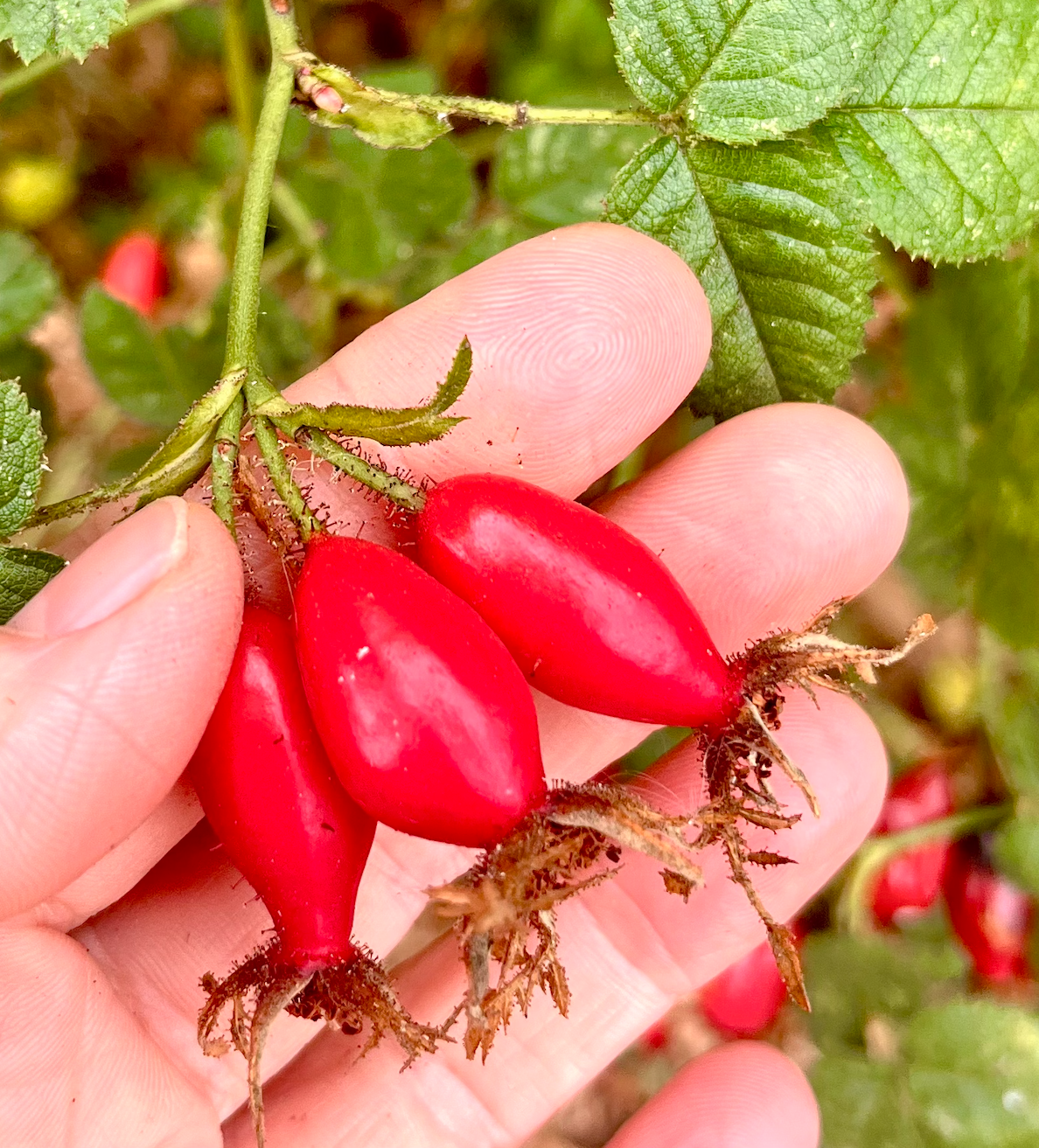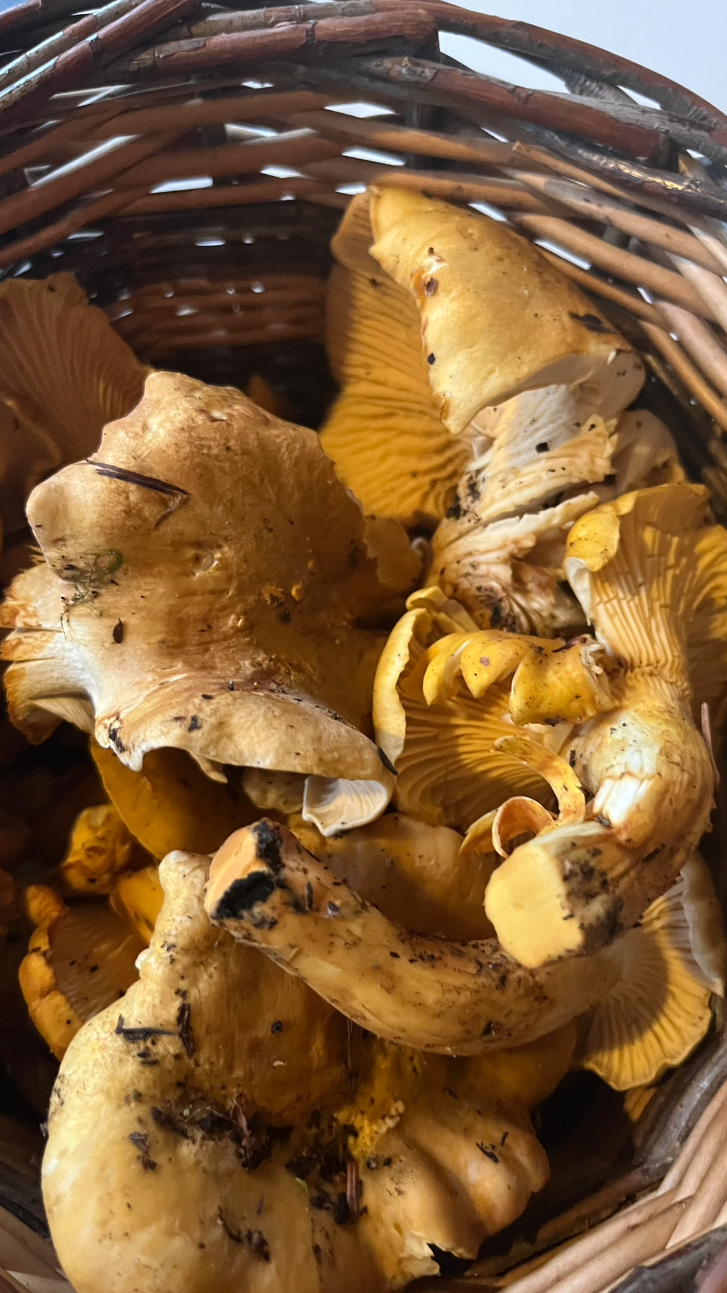



Foraging Wild Foods Course 2025
March 23, April 27, May 18, June 22, July 20, August 24, September 21, October 19, November 16
All classes are on Sundays from 10 am – 4 pm.
Over these nine months we will explore how harvesting food from our landscapes fosters a deep connection to where we live, the people we are in space with and with ourselves. Classes will consist of wild harvesting excursions, simple gathering times around a fire to explore topics around ethical harvesting, building community and self care methods. We will also be creating and installing harvesting spaces to support the abundance of the plants we love for the future and as a way of reciprocity.
Classes meet in different locations each month. Harvests will range from wild greens in the spring, edible flowers and berries in summer, and mushrooms and roots in the fall. Participants will bring their harvests home for their own kitchens. There will be demonstrations of how to process our harvests into jams, pestos, broths, teas, honeys and other food preparations.
This program is well suited to be taken with the Foundations of Herbal Program, which has more in depth theory of Western Herbalism which meets the Saturday prior to this class and also with our Seed to Medicine: Growing Medicinal Plants course and it is also great taken on its own.
Harvests
Harvests for this year will depend on availability for each class. In past years we have harvested wild greens/blossoms like: nettles, chickweed, peppercress, miner’s lettuce, maple blossoms, maple shoots, sorrel, cleavers, salmonberry blossoms, waterleaf, cat tail, violets, douglas fir new shoots, and rose petals.
We will spend a day exploring the many types of medicinal and edible seaweeds that are prolific here.
Berry harvests have consisted of thimble berry, salmonberry, black cap raspberry, various other species of raspberries, wild strawberry, elderberries, salal berry, bunchberry, service berries/saskatoon, red, blue and black huckleberries, crab apples, hawthorn berries and rose hips for jam making.
We focus on cultivation of bulbs that are traditional for this bioregion for food like camas, wild onion as well as others and also ramps which is an endangered wild food in the Eastern part of the country.
Mushroom harvests have consisted of morels, chanterelles, oyster mushrooms, shaggy manes and lobster mushrooms.
We will also go through the process of tapping big leaf maple trees to make maple syrup.
Instructor
The course is led by Leslie Lekos, director of Wildroot Botanicals.
Locations
We will be meeting in adjacent areas to Bellingham in a different wild area each month. An email will be sent prior to class with details.
Being Prepared for the Weather
We will be outside at our harvesting sites rain or shine. It is important to always come to class prepared to be outside. Good walking shoes are important as well as layers and rain gear for cold weather months. Sunblock and hats are important for summer months. It can also be useful to bring something to sit on and a water bottle for the day.
Discover Pass & National Forest Pass
A Discover Pass is needed at some of the sites we will be traveling to. Please consider purchasing one for the year. It is $35 for a year pass or $11.50/day and can be purchased at http://discoverpass.wa.gov. The pass supports our Washington State Parks. If you’d rather not buy your own pass, in past years some students carpooled. We suggest chipping in for gas money for the driver each day.
There is one class in the late summer when drivers will need to have a national forest pass that can be purchased here.
Lodging for Out of Town Guests
Several of our students come from out of town. We are located between Bellingham and Burlington/Mount Vernon so staying in either location is where students often choose to stay.
Learn More
Visit the Wild Foods course page for more details.
March 23, April 27, May 18, June 22, July 20, August 24, September 21, October 19, November 16
All classes are on Sundays from 10 am – 4 pm.
Over these nine months we will explore how harvesting food from our landscapes fosters a deep connection to where we live, the people we are in space with and with ourselves. Classes will consist of wild harvesting excursions, simple gathering times around a fire to explore topics around ethical harvesting, building community and self care methods. We will also be creating and installing harvesting spaces to support the abundance of the plants we love for the future and as a way of reciprocity.
Classes meet in different locations each month. Harvests will range from wild greens in the spring, edible flowers and berries in summer, and mushrooms and roots in the fall. Participants will bring their harvests home for their own kitchens. There will be demonstrations of how to process our harvests into jams, pestos, broths, teas, honeys and other food preparations.
This program is well suited to be taken with the Foundations of Herbal Program, which has more in depth theory of Western Herbalism which meets the Saturday prior to this class and also with our Seed to Medicine: Growing Medicinal Plants course and it is also great taken on its own.
Harvests
Harvests for this year will depend on availability for each class. In past years we have harvested wild greens/blossoms like: nettles, chickweed, peppercress, miner’s lettuce, maple blossoms, maple shoots, sorrel, cleavers, salmonberry blossoms, waterleaf, cat tail, violets, douglas fir new shoots, and rose petals.
We will spend a day exploring the many types of medicinal and edible seaweeds that are prolific here.
Berry harvests have consisted of thimble berry, salmonberry, black cap raspberry, various other species of raspberries, wild strawberry, elderberries, salal berry, bunchberry, service berries/saskatoon, red, blue and black huckleberries, crab apples, hawthorn berries and rose hips for jam making.
We focus on cultivation of bulbs that are traditional for this bioregion for food like camas, wild onion as well as others and also ramps which is an endangered wild food in the Eastern part of the country.
Mushroom harvests have consisted of morels, chanterelles, oyster mushrooms, shaggy manes and lobster mushrooms.
We will also go through the process of tapping big leaf maple trees to make maple syrup.
Instructor
The course is led by Leslie Lekos, director of Wildroot Botanicals.
Locations
We will be meeting in adjacent areas to Bellingham in a different wild area each month. An email will be sent prior to class with details.
Being Prepared for the Weather
We will be outside at our harvesting sites rain or shine. It is important to always come to class prepared to be outside. Good walking shoes are important as well as layers and rain gear for cold weather months. Sunblock and hats are important for summer months. It can also be useful to bring something to sit on and a water bottle for the day.
Discover Pass & National Forest Pass
A Discover Pass is needed at some of the sites we will be traveling to. Please consider purchasing one for the year. It is $35 for a year pass or $11.50/day and can be purchased at http://discoverpass.wa.gov. The pass supports our Washington State Parks. If you’d rather not buy your own pass, in past years some students carpooled. We suggest chipping in for gas money for the driver each day.
There is one class in the late summer when drivers will need to have a national forest pass that can be purchased here.
Lodging for Out of Town Guests
Several of our students come from out of town. We are located between Bellingham and Burlington/Mount Vernon so staying in either location is where students often choose to stay.
Learn More
Visit the Wild Foods course page for more details.
Cost
$1,200
(1) Regular price is $1200 due before the start of class.
(2) Payment Plan – You have the option of a payment plan of $300 deposit, plus 4 payments of $250 (total of $1300) After your $300 deposit is made, the next payments will be due on the first of each month for 4 months.
(3) If you register for any two 9 month programs, you receive a $100 discount. Use discount code TWOCOURSES2025 at checkout.
Adverse Conditions
Please note that if there are events beyond our control, such as illness, forest fire smoke, or extreme weather that compromise student safety then the school may reschedule a class to another date.
